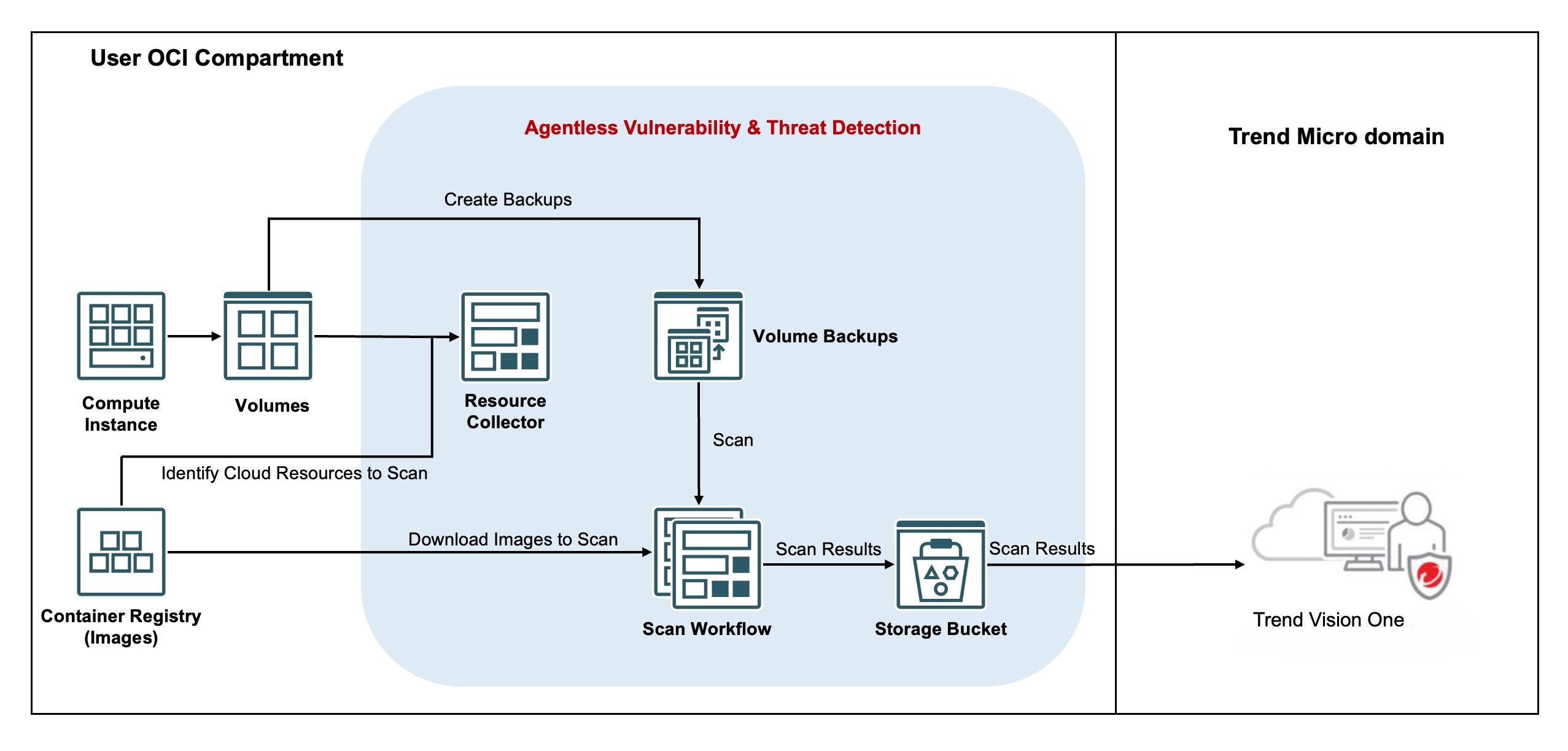Learn how to enable Agentless Vulnerability & Threat Detection in your Oracle Cloud Infrastructure (OCI) compartment and understand provider-specific feature requirements and limitations.
ImportantThis is a "Pre-release" feature and is not considered an official release. Please
review the
Pre-release disclaimer
before using the feature.
|
To start scanning for vulnerabilities and malware in your cloud resources, connect
your Oracle Cloud Infrastructure (OCI) compartment to Trend Vision One in Cloud Accounts using the Terraform template. Enable Agentless Vulnerability & Threat Detection in
Features and Permissions.
Agentless Vulnerability & Threat Detection scans the following OCI resource types:
-
OCI block volumes
-
OCI boot volumes attached to compute instances
-
OCI Container Registry images
Important
|
Agentless Vulnerability & Threat Detection works in OCI by creating and collecting backups of block and boot volumes and collecting
Container Registry images. The collected resources are then scanned for vulnerabilities
and malware.
ImportantAgentless Vulnerability & Threat Detection creates and collects backups of your OCI block and boot volumes prior to scanning
and tags the backups with the tag
trend-micro-product:avtd. Use the tag to identify backups waiting to be scanned and to exclude the backups
from any automated deletion processes you have configured. Backups are automatically
deleted from your OCI compartment after the scan completes. |

NoteIf you remove the Agentless Vulnerability & Threat Detection stack from a compartment, Agentless Vulnerability & Threat Detection automatically deletes all deployed resources. If a scan is in progress during removal,
the Agentless Vulnerability & Threat Detection compute instance, volume, or volume backups may not be deleted. If the resources
are not automatically deleted, you must delete them manually.
|
Scan results are sent to Trend Vision One and can be seen in Cloud Security Posture, Cyber Risk Overview, Threat and Exposure Management, and asset profile screens in Attack Surface
Discovery. Detected risk events display the data source/processor as Agentless Vulnerability
& Threat Detection.
After you patch vulnerabilities or remediate malware in EBS volumes, Lambda functions,
or Lambda layers, the detections no longer appear after the next daily scan. Vulnerability
detections in ECR images remain visible in for seven days after patching. Malware detections in ECR images remain visible in
for seven days after remediation.
NoteSome risk events may be detected by both Agentless Vulnerability & Threat Detection
and another data source or processor connected to Trend Vision One. If more than one
data source detects the risk event, the displayed data source/processor for the risk
event is the data source that most recently detected the event.
|
The following table lists scanning limitations that apply to each supported OCI resource
type.
OCI resource scanning limitations
|
OCI resource
|
Limitations
|
|
Volumes
|
|
|
Container Registry images
|
|
For a list of operating systems supported by Agentless Vulnerability & Threat Detection see Agentless Vulnerability & Threat Detection supported operating systems and language
packages.
The following OCI regions are supported for Agentless Vulnerability & Threat Detection deployment.
Supported OCI regions
|
Region code
|
Region name
|
|
af-johannesburg-1
|
South Africa Central (Johannesburg)
|
|
ap-batam-1
|
Indonesia North (Batam)
|
|
ap-chuncheon-1
|
South Korea North (Chuncheon)
|
|
ap-hyderabad-1
|
India South (Hyderabad)
|
|
ap-melbourne-1
|
Australia Southeast (Melbourne)
|
|
ap-mumbai-1
|
India West (Mumbai)
|
|
ap-osaka-1
|
Japan Central (Osaka)
|
|
ap-seoul-1
|
South Korea Central (Seoul)
|
|
ap-singapore-1
|
Singapore (Singapore)
|
|
ap-singapore-2
|
Singapore West (Singapore)
|
|
ap-sydney-1
|
Australia East (Sydney)
|
|
ap-tokyo-1
|
Japan East (Tokyo)
|
|
ca-montreal-1
|
Canada Southeast (Montreal)
|
|
ca-toronto-1
|
Canada Southeast (Toronto)
|
|
eu-amsterdam-1
|
Netherlands Northwest (Amsterdam)
|
|
eu-frankfurt-1
|
Germany Central (Frankfurt)
|
|
eu-madrid-1
|
Spain Central (Madrid)
|
|
eu-marseille-1
|
France South (Marseille)
|
|
eu-milan-1
|
Italy Northwest (Milan)
|
|
eu-paris-1
|
France Central (Paris)
|
|
eu-stockholm-1
|
Sweden Central (Stockholm)
|
|
eu-zurich-1
|
Switzerland North (Zurich)
|
|
il-jerusalem-1
|
Israel Central (Jerusalem)
|
|
me-abudhabi-1
|
UAE Central (Abu Dhabi)
|
|
me-dubai-1
|
UAE East (Dubai)
|
|
me-jeddah-1
|
Saudi Arabia West (Jeddah)
|
|
me-riyadh-1
|
Saudi Arabia Central (Riyadh)
|
|
mx-monterrey-1
|
Mexico Northeast (Monterrey)
|
|
mx-queretaro-1
|
Mexico Central (Queretaro)
|
|
sa-bogota-1
|
Colombia Central (Bogota)
|
|
sa-santiago-1
|
Chile Central (Santiago)
|
|
sa-saopaulo-1
|
Brazil East (Sao Paulo)
|
|
sa-valparaiso-1
|
Chile West (Valparaiso)
|
|
sa-vinhedo-1
|
Brazil Southeast (Vinhedo)
|
|
uk-cardiff-1
|
UK West (Newport)
|
|
uk-london-1
|
UK South (London)
|
|
us-ashburn-1
|
US East (Ashburn)
|
|
us-chicago-1
|
US Midwest (Chicago)
|
|
us-phoenix-1
|
US West (Phoenix)
|
|
us-sanjose-1
|
US West (San Jose)
|

